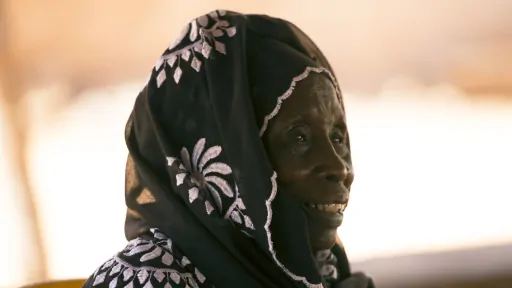Opinion Editorial Archive May, 2018: The Rushing Wind of Change

Queen Elizabeth II celebrated her ninety-second birthday last month. Shortly before that she symbolically stepped down from her role as Head of the Commonwealth of Nations (which comprises the United Kingdom and many of its former colonies). But her dynastic lineage is assured: her eldest son, Prince Charles, will officially assume that title in due course. Likewise, her dynastic lineage as Monarch and Head of State of the UK (and as Monarch of some of its former colonies) was further assured last month: her youngest great-grandson and fifth-in-line to her titles was born.
During her reign many present-day Commonwealth countries have gained their independence from colony status. One of those countries is The Gambia. This month's photo was taken there in the indigenous Mandinka village of Jufureh. Its independence came only as recently as 1965, after two hundred years of British rule. Its reinstatement as a Commonwealth country took place only a few months ago. Its exit, five years ago, was due to its perception of the Commonwealth of Nations as a neo-colonial institution.
As colonies like The Gambia were gaining their independence, many of their citizens migrated, legally, to (and eventually settled in) the UK to fulfill a post-WWII labor shortage. They became known as the "Windrush generation" — after the ship, MV Empire Windrush, which transported almost five hundred of them from Caribbean countries. Given the geographic reach of the former British Empire, many of the Windrush generation were indigenous to their countries of origin.
Last month was also the fiftieth anniversary of a speech that became known as Rivers of Blood, given by British politician Enoch Powell. It was, in many ways, a backlash against the Windrush generation. It divided the British public (with a large majority supporting its anti-immigration rhetoric) and it is still debated whether Powell simply reflected pervasive majority opinion or swayed it.
While the Monarch of the UK has only symbolic political power, indigenous villages in former British colonies like The Gambia have a chief whose political power is real. This is the case in Jufureh. It was there where, if Alex Haley's account is accurate, Kunta Kinte was taken as a slave under the watch of the British. Today the chief of Jufureh is this lady, Tako Taal.
Just like Kunta Kinte did not choose to be taken from his country of birth as a child, many of the Windrush generation did not choose to be taken to the UK as children. Last month a scandal erupted there as many of these children — now adults — faced discrimination and threats (including deportation) due to a clerical faux pas by the British government. The situation remains unresolved. Like Mr. Powell, Amber Rudd was a rising British politician until, just two days ago, she was forced to resign her position of Home Secretary following the fallout from the Windrush generation scandal.
In just over two weeks Queen Elizabeth II's grandson, Prince Harry, will get married. He is in a unique position: his own ascendency to the throne is practically impossible; he is the most popular British royal since his mother; he is about to receive greater worldwide attention than he probably ever will again; his bride has African roots; and he is known for his humanitarianism. His grandmother, predictably, has remained silent on the Windrush generation scandal. He alone has the opportunity to demonstrate that the UK and the institutions it embodies are not neo-colonial. I hope he seizes that opportunity.
Learn more about the Mandinka people.
If you enjoyed reading this month's opinion editorial, please consider supporting independent, advertising-free journalism by buying us a coffee to help us cover the cost of hosting our web site. Please click on the link or scan the QR code. Thanks!

